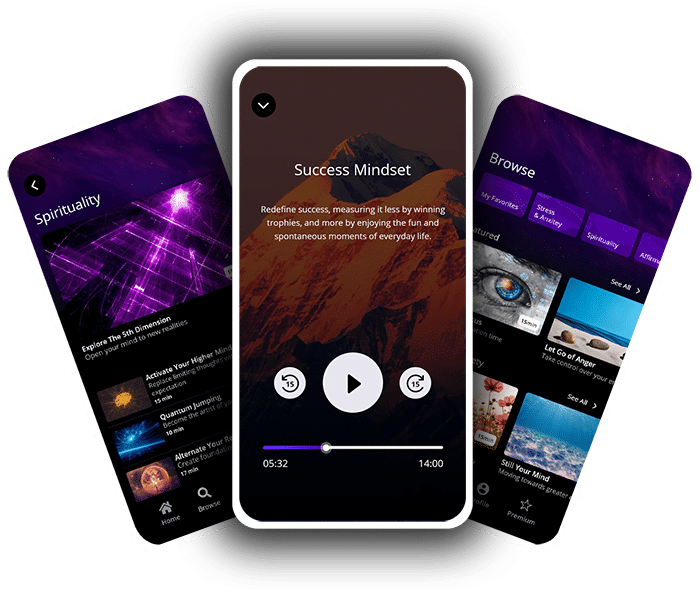Navigating relationships can be tricky, especially when someone close to you may possess attributes of vulnerable narcissism. This subtle form of narcissism combines a need for admiration with an unexpected fragility.
Our article offers insights into the signs and traits of vulnerable narcissists, along with effective strategies to cope if one is part of your life. Stay informed and empowered—read on for guidance that might just shed light on complex interactions.

Unleash Your True Potential!
Explore the world of meditation with our powerful guided sessions crafted to bring peace and strength to your spirit.
But first, let’s ensure our sessions are the perfect fit for you.
Take our short quiz to find out!
Table of contents
Definition of Vulnerable Narcissism
Moving from the broad view of narcissistic personality disorder, we zoom in on vulnerable narcissism. This kind often hides behind a mask of sensitivity, making it harder to spot than the typical brash type.
Vulnerable narcissists feel deep shame and resentment yet crave admiration and sympathy. They might show themselves as shy or modest but are very focused on their self-worth.
Their style is more subtle and less obvious. These individuals may seem quiet or introverted, with a fragile sense of self that easily feels attacked. Constantly seeking validation, they have trouble handling criticism without feeling deeply wounded.
Despite seeming passive, their need for recognition fuels many of their actions and emotional responses.
Signs of a Vulnerable Narcissist
A vulnerable narcissist often exhibits a constant need for validation, showing hypersensitivity to criticism and a tendency towards self-victimization. Their lack of empathy and intense relationship dynamics can also be key indicators of this personality trait.
Constant Need for Validation
Imagine feeling like you always need other people to tell you that you’re good enough. People with vulnerable narcissism live with this feeling every day. They crave compliments and recognition like plants need sunlight.
These folks often seek out others to confirm their worth or abilities. Without this constant approval, they might feel lost or worthless.
They are on a quest for positive feedback, but it’s never quite enough. Every “good job” or pat on the back is like a drop of water in an empty bucket; it never fills up. This deep hunger for validation can push them to fish for compliments or react poorly if they don’t get the praise they hope for.
It’s tough because even when friends and family give support, it might not stick. For someone focused on personal growth and looking inward, understanding this trait can help create healthier relationships with those who have these needs.
Hypersensitivity to Criticism
Vulnerable narcissists often feel attacked when someone offers them feedback. They may get angry or become defensive quickly. These reactions come from a deep place of shame and feeling not good enough.
Their need to seem perfect is strong, so even small bits of criticism hit them hard. This can lead to avoiding any chance where they might be judged.
In their world, every critique feels like a punch to their self-esteem. To cope, vulnerable narcissists might lash out at others or put people down to feel better about themselves.
It’s key for those around them to stay calm and understanding but also firm in setting boundaries for their own peace of mind.
Moving forward, it’s important to understand how these individuals see themselves as victims in many situations..
Self-Victimization
Self-victimization is a key trait of vulnerable narcissism, where individuals often present themselves as the victim in various situations. This behavior can be seen as an attempt to garner sympathy and manipulate others by portraying themselves as constantly wronged or mistreated.
It’s important to recognize this pattern to establish healthier boundaries and protect your well-being when dealing with vulnerable narcissists.
Understanding self-victimization helps in navigating interactions with vulnerable narcissists, allowing for more insight into their manipulative behaviors and emotional dynamics – ultimately leading the way to effective coping strategies.
Lack of Empathy
When dealing with individuals exhibiting self-victimization, it’s crucial to recognize the underlying lack of empathy that often accompanies vulnerable narcissism. This lack of empathy doesn’t lead to a diagnosis in itself but serves as a foundation for other traits, such as arrogance and an excessive need for validation.
Understanding this can help in coping and interacting with those displaying these characteristics.
Signs such as dismissing others’ emotions, being insensitive to their needs, and showing a general disregard for the feelings of others are key indicators of this lack of empathy. By recognizing these signs early on, one can navigate interactions more effectively and establish healthier boundaries when engaging with individuals demonstrating vulnerable narcissistic tendencies.
Intense Relationship Dynamics
Vulnerable narcissists create intense relationship dynamics, seeking constant validation and attention. Their hypersensitivity to criticism can lead to volatile interactions with loved ones.
Additionally, their lack of empathy could result in emotionally distressing situations for those around them. Recognizing these traits is crucial for dealing with vulnerable narcissists effectively in relationships.
Their constant need for validation and sensitivity to criticism can create intense emotional turmoil within relationships, making it essential to establish firm boundaries while engaging with them.
Causes of Vulnerable Narcissism
Childhood trauma, emotional neglect, and abuse can sow the seeds of vulnerable narcissism in a person’s psyche. The impact of early experiences can shape one’s self-concept, leading to deeply rooted feelings of inadequacy and unworthiness that drive the development of narcissistic traits.
Furthermore, genetic predispositions coupled with environmental factors play a significant role in shaping vulnerability and narcissism patterns. It is essential to understand that vulnerable narcissism may emerge from various complex interactions between childhood upbringing, genetic makeup, and environmental influences.
Moreover, people can develop some traits associated with vulnerability and narcissism at an early age. These aspects are not solely confined to adulthood; rather they can be seeded in childhood due to specific relational dynamics or adverse experiences.
This necessitates a holistic understanding encompassing both biological and environmental factors when addressing the causes of vulnerable narcissism – it is rarely attributable to one single cause but often results from a combination of intricate interacting elements.
Comparing Vulnerable Narcissism to Other Types of Narcissism
Understanding the roots of vulnerable narcissism sets the stage for a deeper exploration into how it contrasts with other narcissistic profiles. This comparison paints a clearer picture, guiding us toward more effective interactions with those who exhibit narcissistic tendencies. Below is a comparison of vulnerable narcissism to other types of narcissism.
| Type of Narcissism | Key Traits | Behavior Patterns | Underlying Feelings |
|---|---|---|---|
| Vulnerable Narcissism | Insecurity, hypersensitivity to criticism, self-victimization | Seeking sympathy, passive-aggressiveness, internal distress | Feeling inadequate, fear of judgment, deep-seated inferiority |
| Grandiose Narcissism | Exhibitionism, dominance, superiority | Overt attention-seeking, arrogance, entitlement | Overcompensation for insecurities, desire for control |
| Malignant Narcissism | Aggressiveness, paranoia, antisocial behavior | Exploitation, manipulation, hostility towards others | Intense envy, disregard for others, pursuit of power |
By delineating these differences, we gain a nuanced appreciation of narcissism’s varied manifestations, better equipping us with strategies for personal growth and mindful interactions.
Coping Strategies for Dealing with Vulnerable Narcissists
Setting firm boundaries is very important when dealing with vulnerable narcissists to protect your own well-being. Getting an unbiased perspective from a trusted friend or mental health professional can provide many valuable insight and support.
Disengaging emotionally and not falling for their manipulative tactics can also help in managing interactions with vulnerable narcissists. Meditating can help a lot to deal with emotional stress and find the clarity you need.

Unleash Your True Potential!
Explore the world of meditation with our powerful guided sessions crafted to bring peace and strength to your spirit.
But first, let’s ensure our sessions are the perfect fit for you.
Take our short quiz to find out!
Setting Firm Boundaries
Establishing clear and unwavering boundaries is essential when dealing with vulnerable narcissists. They often struggle to respect the limits of others, making it crucial to assert your boundaries firmly and consistently.
Having a well-defined exit strategy in place is important as some vulnerable narcissists may react with narcissistic rage when faced with established boundaries.
In navigating interactions with vulnerable narcissists, setting firm boundaries becomes a critical tool for safeguarding your mental and emotional well-being. It provides a necessary structure for preserving your peace and autonomy while dealing with individuals who may not readily acknowledge or respect personal limits.
Getting an Unbiased Perspective
Seeking an unbiased perspective can bring clarity when dealing with vulnerable narcissists. Trusted friends, family members, or mental health professionals can offer valuable insights.
Understanding the situation from an outside point of view is crucial for establishing healthy boundaries and coping effectively. It’s important to seek support from those who understand the complexities of vulnerable narcissism and can provide guidance based on evidence-backed strategies rather than assumptions or biases.
Disengaging Emotionally
To effectively deal with vulnerable narcissists, disengaging emotionally is vital. Setting firm boundaries helps protect your emotional well-being from their manipulative behavior.
Recognize and resist the urge to get drawn into their emotional turmoil. Utilize coping strategies such as mindfulness and meditation to maintain inner peace when interacting with vulnerable narcissists.
Remember, prioritizing your mental health is crucial when dealing with individuals exhibiting traits of vulnerable narcissism.
Don’t Fall for Their Charade
Recognize their manipulation tactics and don’t get entangled in their web of deceit. Stay grounded in your reality and don’t let their false narratives sway you. Set clear boundaries to protect yourself from their emotional manipulation, and seek support from trusted individuals who can provide a balanced perspective.
Remember that engaging with a vulnerable narcissist may lead to further emotional turmoil for you.
Stay vigilant against falling into the trap of trying to rescue or fix them – this is not your burden to bear. Protect your well-being by prioritizing your mental and emotional health above attempting to appease or change the behavior of a vulnerable narcissist.
Treatment Options for Vulnerable Narcissists
Psychotherapy aims to address specific traits associated with vulnerable narcissism, offering a path toward self-improvement and healthier relationships. Therapy sessions can help individuals understand their behavior patterns and develop empathy while working on managing their intense emotional reactions.
Additionally, building resilience through therapies like journaling or online-therapy can assist in combating the negative effects of vulnerable narcissism. These tools provide practical ways for individuals to gain insight into their emotions and cope with underlying issues, promoting personal growth and mental well-being.
Conclusion
Understanding vulnerable narcissism is crucial for identifying and dealing with these individuals. Setting boundaries is essential in managing their constant need for validation. Recognizing the signs and traits of vulnerable narcissists can help in maintaining a sense of self when interacting with them.
Seeking professional help is important when dealing with the complexities of vulnerable narcissism, both for oneself and others involved.
FAQs
What is a vulnerable narcissist?
A vulnerable narcissist is someone with a mental health condition called narcissistic personality disorder (NPD). They often feel low self-esteem and can be very sensitive to what others think of them.
How do vulnerable narcissists act differently from other people?
Vulnerable narcissists may seem shy or anxious, and they can get easily hurt by rejection or criticism. Unlike the bold image we might have of a typical narcissist, these folks often hide their grandiose feelings and may appear insecure.
Can you list some traits of a vulnerable narcissist?
Sure! Traits include being very sensitive to how others see them, having intense reactions to feeling ignored or shamed, acting jealous or envious, and showing passive-aggressive behaviors when upset.
What makes dealing with a vulnerable narcissist challenging?
Dealing with a vulnerable narcissist can be tough because they might take things personally and blame others for their problems. Sometimes, they even play the victim or need constant attention to feel good about themselves.
Are there ways to cope if I know someone who’s a vulnerable narcissist?
Yes! It helps to set clear boundaries and stick to them—being firm but fair is key. Also try not to take everything they do personally—it’s about their issues, not you.
Do therapists have strategies for helping someone with vulnerable narcissism?
Therapists can offer help by teaching coping skills that boost emotional stability, addressing past trauma gently and directly—and sometimes exploring underlying issues like depression or anxiety that add fuel to the fire.










